- Home
- Jack Kerouac
Visions of Cody Page 4
Visions of Cody Read online
Page 4
The sharp little rich Jewish lady in a fur coat who lofts an umbrella that catches the eye it’s so expensive and designed (red on brown) so beautifully, cutting along with that surefooted bandy legged gazotsky waddle that distinguishes her from other ladies, the great high civilization peasant woman of swank apartments with a hairy husband Aaron who deals in high finance with the gravity and hirsute slowness of an ape, she’s headed home with a package and the rain like other things does not distress her—
The Irish gentleman all bundled tightly in a dark greenslick raincoat, collar up, tight at his raveled chin, hat, no umbrella, a little anxious as he proceeds somewhat slowly to his objective and lost in thought of his job or wife or by God anything including feelings of homosexual deterioration or that Communists are secretly controlling his life at this very moment by thought-waves from a machine projecting from a submarine five miles offshore, maybe a teletype operator at U.P., thinking this as he goes down Sixth Avenue the name of which was changed to Avenue of the Americas some years ago to his complete disgust, going along surrounded by this entire night of dark rain in this moment of time that he occupies with a white scared sidelook at something on the bottom of the sidewalk (which isn’t me)—
The young darkhaired plump pimply guy of thirty in a blue cloth jacket, from Brooklyn, who spends Sunday afternoons reading funnies (“Mutt ’n’ Jeff”) and listening to ballgames on the radio, cutting along from his job as shipping clerk in an office near The New Yorker on 45th Street and thinking, suddenly, that he forgot the new key to the garage he had made this noon, forgot it on the dispatcher’s desk in that empty blue light but it’s raining so goes on home and he too surrounded by rainy night and the Hudson and East rivers but can only be interpreted in terms of his garage keys (at this moment)—
—Irwin Garden, Nardine, it seems they now went by separately—
—The strange old crazy lady from out of town who waddles like going over firewood in the yard of the farm she comes from, or did, before she moved to the upstairs flat in a wooden tenement block in New Brunswick, with her companion looking for a place to eat, her feet in those half heeled old lady black shoes very tired and so tired she lags behind her companion (similar but not so eccentric or unspeakably individual and tragic old lady) and sees this cafeteria, yells “Here’s a place to eat,” companion answers: “It’s only a cafeteria and the food is awful in those places, George told me to stick to little restaurants”—“But there aren’t any!” (and quite naturally, they’re on Sixth Avenue and the restaurants are all on sidestreets mostly, the ones with white tablecloths, etc., although they will hit such restaurants if they keep distressing in the rain on up six more blocks to near Radio City)—So they decide, or that is Companion decides Stewart’s Cafeteria is nowhere and my old eccentric lady with her curly gray hair and great low hanging appurtenances that touch the sidewalk such as umbrella, packages held low-dangling and almost underhanging from a limp blue-veined marble white oldlady dear crazy finger and the low hem of her enormous oldlady greatcoat that looks like it was made to be a thick shroud to hide the atom bomb in in the middle of an airfield at dawn so nobody could tell what it looked like—this poor crazy old lady is like my aunts, from Winchendon, Maine, etc., from woods who come gawking out of the forest of the night to see great glittering New York and are so themselves the raw creatures of time and earth that in New York they are completely lost, don’t lose their woods look, suffer on smooth sidewalks of concrete the same pain and awkwardness and womanly Gea-like distress and ecstatic agony that they suffer in pinecone rows beneath the cobwebby moons of New Hampshire or even (name it) Minnesota—and so are really doomed as in this case never not only to find a restaurant that will glowingly symbolize New York for them so they can go home and tell the glorious story in detail by the pantry window, the little one that looks out on the woodpile and one Arctic star—they won’t even find any restaurant and’ll wind up in a big beat Greek lunchcart six feet by ten because their feet will have given out and they’ll capitulate to something in New York they wouldn’t even think of accepting in Winchendon or Fergus Falls and never will they tell this shameful story without a true sense of forest sistership anyway in a nonexistent goddamn New York.
As far as young women are concerned I can’t look at them unless I tear off their clothes one by one including this last girl (with her Ma) wearing a green bandana and cute little face and long newlook coat, and low heels, walks throwing her thighs loosely as though floppy and not as much control as her youth would indicate, and the big coat hides her figure lines but I figure her cunt is sweet, you get to it via white lace panties, and she be fine. This is almost all I can say about almost all girls and only further refinement is their cunts and will do.
* * *
FOLLOWING LEE KONITZ the famous alto jazzman down the street and don’t even know what for—saw him first in that bar on the northeast corner of 49th and Sixth Avenue which is in a real old building that nobody ever notices because it forms the pebble at the hem of the shoe of the immense tall man which is the RCA Building—I noticed it only the other day while standing in front of Howard Johnson’s eating a cone, or rather it was too crowded for me to get a cone and I was just standing there and I was thinking “New York is so immense that it would make no difference to anybody’s ass if this building exists and is old”—Lee, who wouldn’t talk to me even if he knew me, was in the bar (from which I’ve made many phonecalls) waiting with big eyes for his friend to show up and so I waited on corner to think and soon I saw Lee coming out with his friend who’d arrived and it was Arnold Fishkin the Tristano bass-player—two little Jewish gazotsky fellows they were really as they cut across the street and Konitz in that manner that was forceful and I said to myself “He can take care of himself even though he goofs and does ‘April in Paris’ from inside out as if the tune was the room he lived in and was going out at midnight with his coat on”—(but I haven’t heard him for weeks and weeks)—Both of them real small among the crowds, Fish-kin is five-foot-three or such and Konitz five-six or such—cutting along so I follow, and they turn west at 48th, I go across the street, temporarily bemused first by a sign for a large furnished room with cooking privileges and bath in a beat sort of hidden tenement smack in the cunt of midtown but how can I live there or even be like Lee Konitz cutting around the world of men and women when my father told me to take care of my mother on his deathbed (these my thoughts)—and where d’you think they go but Manny’s the music store of hipsters and Symphony Sid but which however at this moment (and strangely connected with the feeling I had had while waiting for Konitz looking over big buildings to see Atlantic clouds blowing in from sea and realizing sea is bigger even than New York and that’s where I oughta be) is filled with a whole crew of sailors apparently in the store to buy equipment for a big whaling oompapa Navy band! And Konitz goes completely unrecognized by them although the Danny Richman-like owners know Lee so well they don’t say to him, as I would, “Where you playing now, great genius?” they say “When you leaving?” knowing already of his road plans—Lee buys reeds or such in a box almost but not quite big enough for an alto (and already packed and waiting for him) and then he and Fishkin cut around the corner (as I follow through a sea of crowds) to a mysterious marble lobby of big office buildings and cut right upstairs on foot and in fact a whole bunch of hip looking guys are coming to do same (avoiding elevators) and I study board to find out big deal on second floor or third (walkup) floor but nothing, so the mystery remains though I still say it must be a music school and this was typical of my lostness and loneliness, I go around dressed like a bum with a seedy envelope, have no Fish-kins to walk with, unless I’m drunk, and spend my time watching the frenetic lights of Times Square (the huge current Quo Vadis montage that goes up almost as high as Astor Hotel roof, a blue-light woman tied to a stake that goes higher than her head in blue-light eyries and neons burning a painting of Rome that has in it eighteenth-century tenements of Pittsburgh quite Georgian and
also Greek Parthenons, MGM presents on white neons then huge QUO VADIS lighting up, first ordinary, then running, then blinking, then shivering, then in the climax running-blinking-shivering as if coming) and this sign is bigger than next door’s TEN TALL MEN which is big enough and biggest I ever saw till QUO VADIS, and I am lonely and small in all this, goodnight.
* * *
A SAD PARK OF AUTUMN, late Saturday afternoon—leaves by now so dry they make a general rattle all over and a little girl in a green knit cap is squashing leaves against the wire fence and then trying to climb over them—also mothers in the waning light, sitting their kiddies in swing seats of gray iron and pushing them with grave and dutiful playfulness—A little boy in red woodsman shirt stoops to drink water at the dry concrete fountain—a flag whips through the bare bleak branches—salmon is the color of parts of the sky—the children in the swings kick their feet in air, mothers say Wheee—a trash wirebasket is half full of dry, dry leaves—a pool of last night’s rain lies in the gravel; tonight it will be cold, clear, winter coming and who will haunt the deserted park then?
* * *
IN FALL 1950 when I was so much on weed, three bombs a day, thinking about unhappiness all the time I one night really carefully and high listened to George Handy’s “The Blues” (Vicki had his picture up on wall with mine and Charlie Parker’s, the mind, the hand, and me the heart she said) but to really drift and I found it a big mocking sound and specifically the joy of the bop middle with Herby Steward is rejected for this modern or rather sadomasochistic modernity, on T I was able to see that Handy was sacrificing joy which existed naturally in his heart for the glooms and despairs and great disappointed deaths, the deadly loss of ego, the last acknowledgement of self—the music seemed to say “There are still a few things that you can cling to and this I supposed you should be soothed about—ha ha—but you won’t even get that—though there’s joy in our souls (bop interlude) we are nothing but shits and we’ll all die and eat shit in graves and are dying now.” Pretty powerful talk!
* * *
MORE AND MORE I THOUGHT OF CODY, I wanted to say to him “All of a sudden I remember a sunset when my father was driving me and his buddy Old Mike Fortier and I think young Mike my buddy was there too, in this old ’34 Plymouth, to Nashua, N.H. to meet a circus man they were playing poker with, maybe it was W. C. Fields!, in the summertime, my father wearing a strawhat that with certain types of faces, say Jimmy Foxx’s has gone completely out of American life, me noticing and never to forget again a certain house by the side of the road, a farmer’s house or more exactly the house of a callous-fingered character of the woods like you must have in the West who always has two, three cords of wood stacked in his yard and maybe drives into town Saturday nights in his Essex that he uses the back of for loads of wood to buy the Sunday funnies, that kind of hodgepodge made-by-himself house and my thoughts ran along just about what I’m saying now eighteen years later; dreaming this, and also on the big inclusive event of the sinking sun, especially as it showed slanting and golden and all that in the grass, when suddenly Old Mike lit his pipe and puffed and this unforgettable inexpressively rich smell pervaded the car as they went right on talking: a smell that I remembered just tonight again, nothing less than a big man poking pudgy fingers at the bowl of his pipe on an ordinary afternoon in 1933 when probably you, at seven or six, were doing any one of the innumerable visions I have of you in Denver at all ages—a smell that wasn’t so much a certain tobacco but arose like a genie from the fact that Old Mike had to do with its inception. The smell was Mike himself, my buddy’s father, the big favorite of a mad gang my father had (all of them with wives, children, houses, just like you), who used to sneak up on one another, I remember sitting in the parlor listening to the old pre-Basil-Rathbone Sherlock Holmes on the radio with my father and sis and suddenly in kitchen I see a man creeping up like an Indian with twelve people creeping behind him from the kitchen door and it’s a surprise party which rocks house (small rose-covered cottage, actually and no shit, next to a rickety grocery store, on West Street Lowell) till dawn, Big Mike was the leading maniac of the gang or that is at least the biggest most hearty swearer, shocked even the screeching ladies of this exclusive French-Canadian raucous madclub while another madcap (Monette) was actually the chief Indian creeper and screamer, I think in fact put on women’s clothes and screamed like Finistra, but anyway at the same time Old Mike was also the most grave, sober, quiet and meditative one at other times, and was smoking his pipe thus when the memory was instilled in me by the same forces eighteen years ago which now drive me obsessively to remember. When a man puffs a pipe his eyes bulge over the smoking bowl into space, he seems to have sinus trouble and all such big adult wreckages and profound architectural failings that on the other hand couldn’t possibly exist if the man wasn’t a pillar of strength and didn’t have huge belly to stand it; I had seen Mr. Fortier staring at me over his pipe with the same bulging eyes when I semitiptoed past his ‘den’ in the Fortier house, always fearful of disturbing the privacy of such an enormous father, he had ten kids, a three-hundred-pound wife and believe this: a sixteen-room house with a few old lady lodgers far off in the bowels somewhere, a house, with concomitant cellar, so vast, so unbelievable that I since dream of it as a boat floating to Boston and Greenland on a canal, not a rich house or manse or anything just an old New England monstrosity he’d bought for say ten thousand dollars smack in the middle of the wild Canuck tenements of Salem Street, always fearful that he would see me pass and then I’d have to say something which never came out without an effort so agonizing and personal to something lost in me that I’d go away grabbing my sweater and cursing myself…but now he was sitting beside me, fatherly, I had no cause to be scared though as I say I always felt he liked my old man but not me, that something separated me from those qualities in my old man that made him love the name Duluoz, and that ‘something’ was lost to me forever, I’d never get it back even to examine it, and in fact I realized it was all a big paranoia of mine (even then you see!). Oh Lord have pity on our souls—and the pipesmoke suddenly became the fulfillment of the fact that this tremendous father was and had been all along accepting me, thus, following the events of yesterday…the loneliness…the (as Proust says God bless him) ‘inexpressibly delicious’ sensation of this memory—for as memories are older they’re like wine rarer, till if you find a real old memory, one of infancy, not an established often tasted one but a brand new one!, it would taste better than the Napoleon brandy Stendhal himself must have stared at…while shaving in front of those Napoleonic cannons….”
* * *
SUBURBAN CITY “FOOD SHOP” of which there is none bleaker than this one in the gloomy Jamaica night—the MERIT Food Shop, written in green neon (greon) in the window, MERIT is, and Food Shop in orange—now why?—You pick up your ticket cafeteria style coming in, the thing rolls and rings. The floor is all shades of brown and yellow “pebbled” marble with little thin metal lines separating various sections; covered with dirty napkins (from metal boxes on counter), cigarette packs, clusters of sawdust tracked from behind counter—Two waitress-type girls who just came in of course brighten it up and make me think of Hartford though I look mad with beard, shirts—What’s so bleak-Jamaica itself; secondly the cold sad Sunday midnight; nobody knows anybody else, not even as in 23rd Street Rikers, suburban cities are centers of vast residential districts so big out-of-town people couldn’t conceive—people in here live miles and miles apart, are going through Jamaica in the transportation system only—The coffee is given to you intact with cream, always too much cream—Further dark faced types in topcoats suddenly begin talking about Columbia game with counterman (as though they were fraternity presidents with golden hair)—Inconceivably quiet switchmen from Long Island Railroad (L.I.R.R.)—Outside all I can see of the night is a green neon clock that says WATCH HOSPITAL around the time which is in red—A tall usher-like thin boy came in for coffee and hamburger—going home now theater’s closed (a
nd can’t even cook one in his own kitchen), going home along cold suburban street with wind and dry leaves and dark—
This place is bleaker than any Rikers and of course any lunchcart because there’s nothing to define it with—how can I describe this table top I’m on, this marble plytex with metal rim?
Ah fuckit, I’ll go home and think in the dark.
The first desk on Phoebe Avenue—first brown desk—was placed against the wall in the room that served as the dining room only when we had company—the furniture still had chalkmarks under made by me and Nin and Gerard—The brown, in fact mahogany darkness of this my first study—and this first desk—window was on left, lace, facing Mrs. Quinn—
Whether her cherry trees were in bloom or not it was brown in this room—when my father had rheumatism in it the sheets of his sickbed made it gray—now this is an “inexpressibly delicious” old memory like old port—nothing in California matches it. I rolled my glassies for the first time on the jagged wood of the desk—it was when I got idea for racing, they meandered a race under my eyes—it was a gray day—the whole idea of the Turf must have come to me like (as just now and not since 1948) that so-seldom experience of seeing my whole life’s richness swimming in a palpable mothlike cloud, a cloud I can really see and which I think is elfin and due really to my Celtic blood—coming only in moments of complete inspiration…. In my life I number them probably below five—at least on this level—
Followed by those first strips of race results, the green ones—the Turf was inexpressibly connected with masturbation as Haunted Memories like this must be.
* * *
ST. PATRICK’S CATHEDRAL: most striking of the windows and I didn’t expect strikingness at this late hour—is at upper front left—a lonely icy congealed blue with streaks of hot pink—little blue holes—painted with an immeasurable blue ink, noir comme bleu, black like blue, I was going to say three Apostles but there are only two, third slot is not figure, is three one-third-size endisced figures almost like holes in skating ice—but with a winter swamp water full of mill dyes and midnight—no sky has had the color of this glass, and I know skies—all other windows here now dimming except this—It faces East, must be amazing tomorrow morning—faces East like my poor hospital window—Lord, I scribbled hymns to you—the other windows grow rich, brown, dark, secret, get better with age of light like wine with age of Time—The halo round the head of first figure remains bright and shining in the now general midnight blue of the window—halo of second figure is more humble—this window is secreted away and almost has same color as windows at halfway point turning point of stairs in old Victorian homes—concealed too—Only now I begin to notice the green—The similar triple window behind and above altar is now gone into the night—but not here. St. Jean Baptiste is smaller than this but I think more holy because of Canadians’ Sunday morning at 5:30 like Marie Louise—Now the window darkens to match the great transformations without, refracting them inward to these kneelers, who can’t stand ordinary glare of life in their musty meditations and guilty anxieties—People come to church for guilt now—Ah, a French insurance salesman over there (from Centralville)—from Forest Hills vraiment—an older Pat O’Brien in dark almost priestlike suit to my left—clutches prayer book devoutly, closes eyes with matching fervor—O huge sorrow!

 Tristessa
Tristessa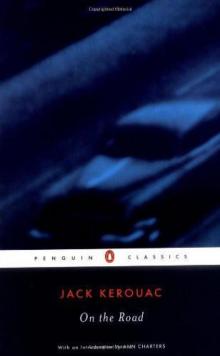 On the Road
On the Road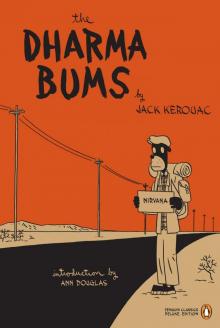 The Dharma Bums
The Dharma Bums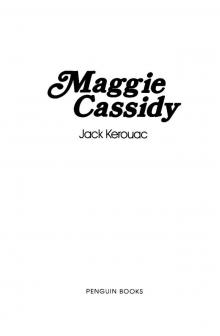 Maggie Cassidy
Maggie Cassidy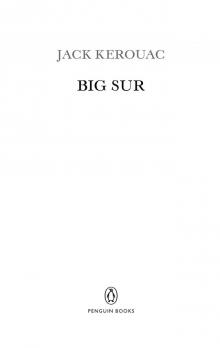 Big Sur
Big Sur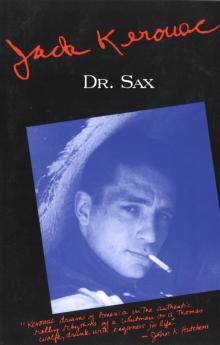 Dr. Sax
Dr. Sax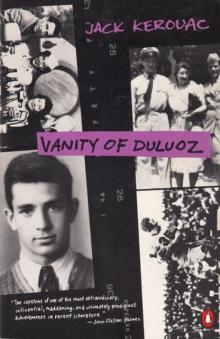 Vanity of Duluoz: An Adventurous Education, 1935-46
Vanity of Duluoz: An Adventurous Education, 1935-46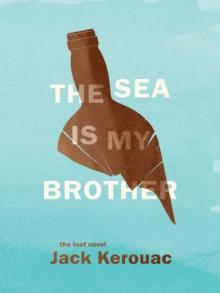 The Sea Is My Brother
The Sea Is My Brother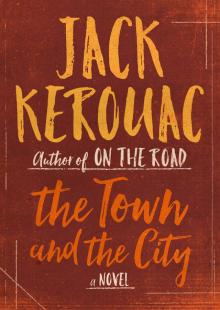 The Town and the City: A Novel
The Town and the City: A Novel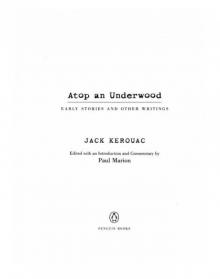 Atop an Underwood: Early Stories and Other Writings
Atop an Underwood: Early Stories and Other Writings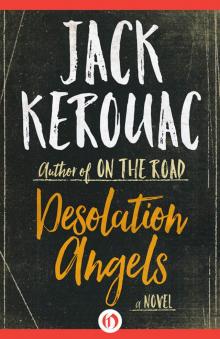 Desolation Angels: A Novel
Desolation Angels: A Novel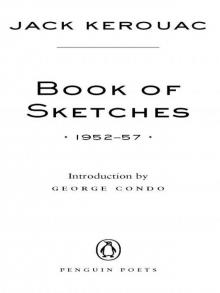 Book of Sketches
Book of Sketches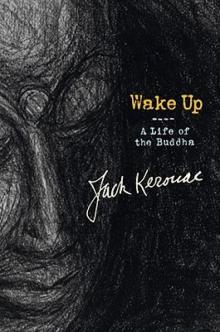 Wake Up: A Life of the Buddha
Wake Up: A Life of the Buddha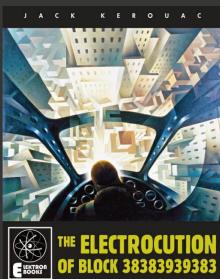 The Electrocution of Block 38383939383
The Electrocution of Block 38383939383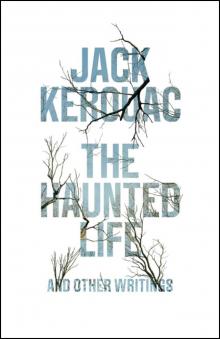 Haunted Life
Haunted Life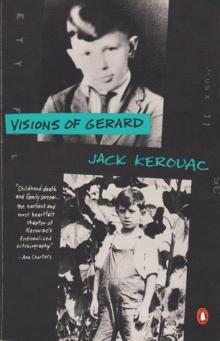 Visions of Gerard
Visions of Gerard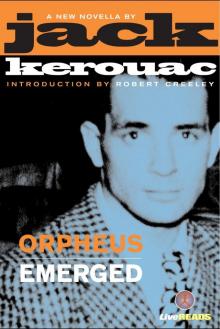 Orpheus Emerged
Orpheus Emerged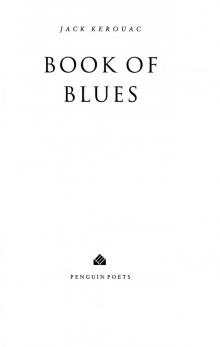 Book of Blues
Book of Blues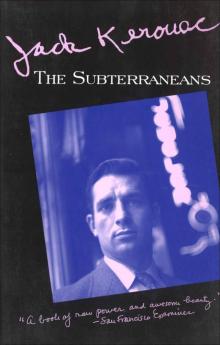 The Subterraneans
The Subterraneans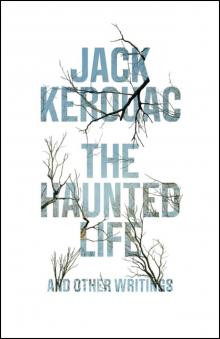 The Haunted Life
The Haunted Life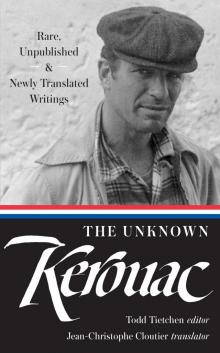 The Unknown Kerouac
The Unknown Kerouac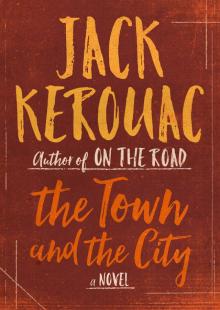 The Town and the City
The Town and the City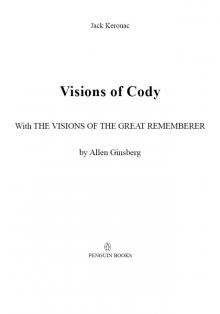 Visions of Cody
Visions of Cody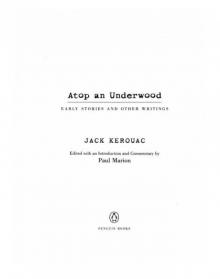 Atop an Underwood
Atop an Underwood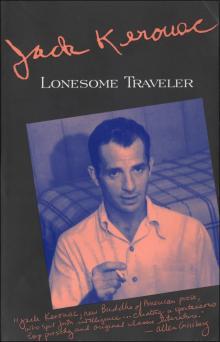 Lonesome Traveler
Lonesome Traveler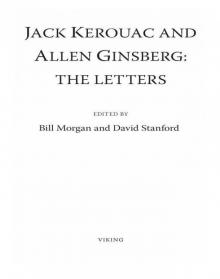 Jack Kerouac and Allen Ginsberg
Jack Kerouac and Allen Ginsberg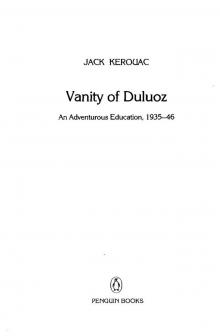 Vanity of Duluoz
Vanity of Duluoz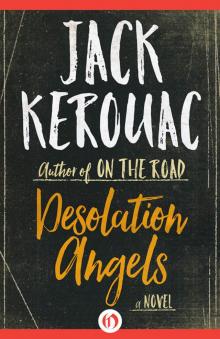 Desolation Angels
Desolation Angels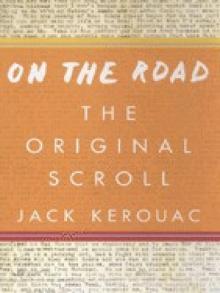 On the Road: The Original Scroll: (Penguin Classics Deluxe Edition)
On the Road: The Original Scroll: (Penguin Classics Deluxe Edition)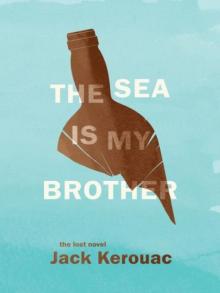 The Sea Is My Brother: The Lost Novel
The Sea Is My Brother: The Lost Novel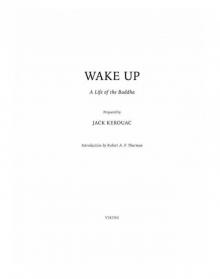 Wake Up
Wake Up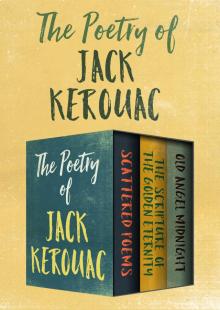 The Poetry of Jack Kerouac
The Poetry of Jack Kerouac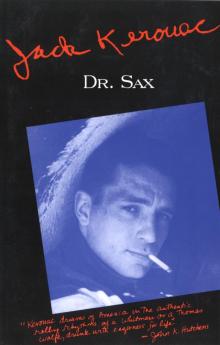 Doctor Sax
Doctor Sax